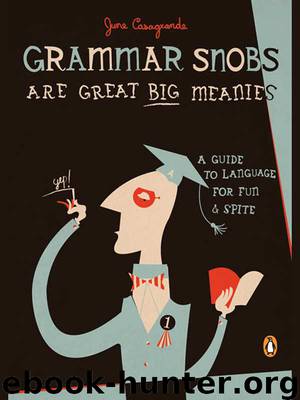Grammar Snobs Are Great Big Meanies by June Casagrande

Author:June Casagrande
Language: eng
Format: epub
Publisher: Penguin Group US
Chapter 23
I Wish I Were Batgirl
The Subjunctive Mood
As a tot, I was a big fan of the Batman TV series. I once wrote a letter to Batman and actually received a reply. It took decades to realize that the reply had been in my mother’s handwriting.
My Batmania occurred at such a young age that I really can’t remember much of it, but family lore has it that I took this fascination to unhealthy extremes. According to sources close to me, I once dressed up as Batgirl for Halloween. But for me, that holiday didn’t end on November 1. No, reportedly I continued to wear the dark tights, cape, and leotard with the Batman-logo sticker on the chest for many weeks after the trick-or-treating had ended. But, in true superhero style, I added my own twist: the cut-off top of a plastic milk jug—the kind with a long, curved spout—worn as a hat.
When I sported this ensemble in public, strangers would ask, “Who are you supposed to be?” No doubt this was a stalling tactic as they tried to remember the name of the state’s bureau of child mental health services. I would answer, “I’m Batgirl. But you can call me Batty.” Then the stranger would dart in the direction of the nearest pay phone.
Now, if you think that’s a tragic tale, consider that that same little girl grew up to find herself sitting among a pile of books trying to figure out why it’s correct to say, “I wish I were Batgirl,” instead of “I wish I was Batgirl.” And if you think nothing can top that tragedy, I’ll share with you some of the half-baked answers I got. But before I take you down that long and cruel road, I feel obligated to first provide you with some simple and practical help.
The choice between “was” and “were” usually hinges on a surprising condition: plausibility. If you’re talking about something hypothetical, something “contrary to fact,” use “were.” (That’s called the subjunctive.) If you’re talking about something that may or may not have really happened—something plausible—use “was,” “am,” or whatever form of “to be” applies to your subject. (This is called the “indicative,” the main mood you use for most speech and writing.)
To better understand the difference between real possibilities and hypothetical possibilities, compare, “If I am batty, I will go to an institution,” to “If I were batty, I would go to an institution.” The first one is considering something that really could happen. The second is speculation, based solely on conformists’ prejudice against us cape-wearing crusaders.
When it comes to the subjunctive, sentences that start with “I wish” or “he/she wishes” are easiest. Because they’re pretty much always hypothetical, they always take “were.” “I wish I were Batgirl, even though now I only get to dress up as her on the weekends and I have to hide when the mailman comes.”
And make sure that any “will” or “would” in a conditional sentence logically follows. “If I were Batgirl, I would look much better in this leotard.
Download
This site does not store any files on its server. We only index and link to content provided by other sites. Please contact the content providers to delete copyright contents if any and email us, we'll remove relevant links or contents immediately.
Asking the Right Questions: A Guide to Critical Thinking by M. Neil Browne & Stuart M. Keeley(5765)
Autoboyography by Christina Lauren(5228)
Eat That Frog! by Brian Tracy(4527)
Dialogue by Robert McKee(4390)
Sticky Fingers by Joe Hagan(4190)
Journeys Out of the Body by Robert Monroe(3621)
Annapurna by Maurice Herzog(3464)
Full Circle by Michael Palin(3443)
Schaum's Quick Guide to Writing Great Short Stories by Margaret Lucke(3376)
Elements of Style 2017 by Richard De A'Morelli(3343)
The Art of Dramatic Writing: Its Basis in the Creative Interpretation of Human Motives by Egri Lajos(3063)
Atlas Obscura by Joshua Foer(2955)
Why I Write by George Orwell(2945)
The Fight by Norman Mailer(2930)
The Diviners by Libba Bray(2928)
In Patagonia by Bruce Chatwin(2922)
The Mental Game of Writing: How to Overcome Obstacles, Stay Creative and Productive, and Free Your Mind for Success by James Scott Bell(2906)
Venice by Jan Morris(2571)
The Elements of Style by William Strunk and E. B. White(2470)
